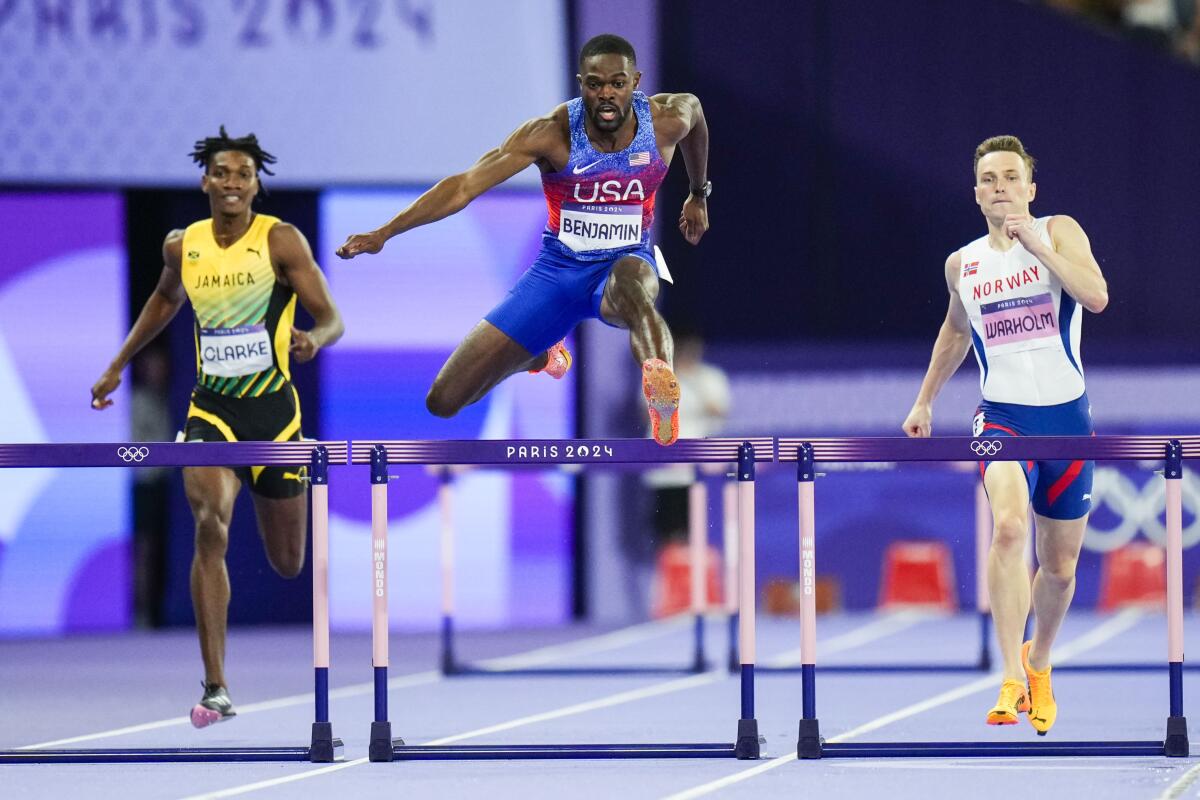Rai Benjamin, who trained at UCLA and USC, wins elusive Olympic gold in 400 hurdles

- Share via
SAINT-DENIS, France — With only three, 36-inch hurdles remaining in the race of his life, Rai Benjamin was in second place, his first championship gold medal in sight, and running off the final turn of the 400-meter hurdles final Friday night at the Paris Olympics when he said a silent prayer.
“Please,” he thought, “don’t fall.”
In a 10-hurdle race, the 27-year-old former UCLA and USC star, who has trained in Los Angeles since 2015, landed awkwardly off the seventh. Benjamin took a step to his right while remaining inside his eighth lane to steady himself. The 400-meter hurdles is a carefully choreographed dance of precisely numbered strides between hurdles and his pattern had been thrown off. He reached for the 10th hurdle, switching his lead leg, and asked himself, for a final time, just to keep going.
For the last three years, Benjamin has told himself something similar. Among the Big Three of hurdlers who had revolutionized times that were possible in the 400 hurdles, Benjamin was often the forgotten man, unable to claim an Olympic title or world record such as Norway’s Karsten Warholm, or a world championship such as Brazil’s Alison Dos Santos, and left to grumble over injuries that hampered him in 2022 and 2023.
That changed Friday on Stade de France’s rain-soaked track as Benjamin stayed upright and pulled away from his chief rivals during the final 100 meters of a dominant Olympic gold-medal performance, winning in 46.46 seconds to lift what he said was a weight.
“It feels great, to be honest with you,” Benjamin said.
Warholm was second in 47.06, with Dos Santos earning bronze in 47.26.
Benjamin smiled while leaning at the finish line, then ran over to fans wearing white T-shirts bearing the saying “RAI VS. THE WORLD.” Benjamin ripped off his paper bib but did not break down in emotion, a celebration that was measured for a reason: Despite years of playing the bridesmaid, the outcome was less a surprise to Benjamin than a confirmation of what he always expected would happen.
“I don’t think I ever doubted it,” he said. “It was moreso just stay patient. … I told myself, yo, this has got to go my way at some point.
“And it went my way today.”
If any of Benjamin, Warholm or Dos Santos had been born in a different generation, they may have laid sole claim to the title as the best ever. Instead, their overlap helped push the event toward unprecedented times, with the 18-fastest all occurring since 2021. Where some point to innovations in shoes and track surfaces Benjamin shrugged.

“Honestly, we’re just better,” he said.
It created one of track’s strongest rivalries as they beat up on one another. Benjamin entered Friday’s final 3-5 against Warholm and 8-2 vs. Dos Santos.
“You can see, watch from Tokyo to Paris,” Dos Santos said. “You can’t predict anything.”
In recent months Benjamin had accepted the possibility that his career may always be defined by holding the unenviable claim of being historically fast — he owns three of the event’s five-fastest times, including the No. 2 all-time mark of 46.17 from the Tokyo Olympics, beaten only by Warholm’s world record — but having only silver and bronze to show for it. It didn’t mean his competitive nature had dimmed. He’d won June’s U.S. trials in a world-leading 46.46 and believed he was the fastest pure runner of his rivals. Instead his acceptance reflected a decision to keep the multiple medals he had achieved in a kind of perspective. As recently as hours before Friday’s final, he told his coaches, USC’s Quincy Watts and UCLA’s Joanna Hayes, that he would be happy regardless of what transpired over those 400 meters.
Sydney McLaughlin-Levrone won the women’s 400-meter hurdles at the Paris Olympic Games, successfully defending her gold medal from the Tokyo Games.
But even as he came to peace, he also came to win. Edwin Moses, the godfather of 40-meter hurdling, once theorized that the 10-hurdle race presented 31 moments for potential failure, beginning with the start and including every takeoff, flight and landing over all 10 hurdles. Benjamin’s moment for failure arrived 28.02 seconds in, on the landing of that seventh hurdle. It was the last time he would trail.
As Benjamin spoke to reporters, an American flag still draped over his shoulders, world record-holder Sydney McLaughlin-Levrone of the U.S. walked up to him after her gold-medal ceremony and hugged Benjamin. Other athletes, including Dutch star hurdler Femke Bol, congratulated Benjamin, too. His story of being the odd man out of the gold-medal hunt was well-known, and the snapping of that streak was well-celebrated among his peers.
“Rai did a great job being composed and he is bringing home the gold,” Warholm said. “At this level everybody says they deserve it. But whoever takes it, he is the better man of the day.”
More to Read
Go beyond the scoreboard
Get the latest on L.A.'s teams in the daily Sports Report newsletter.
You may occasionally receive promotional content from the Los Angeles Times.








